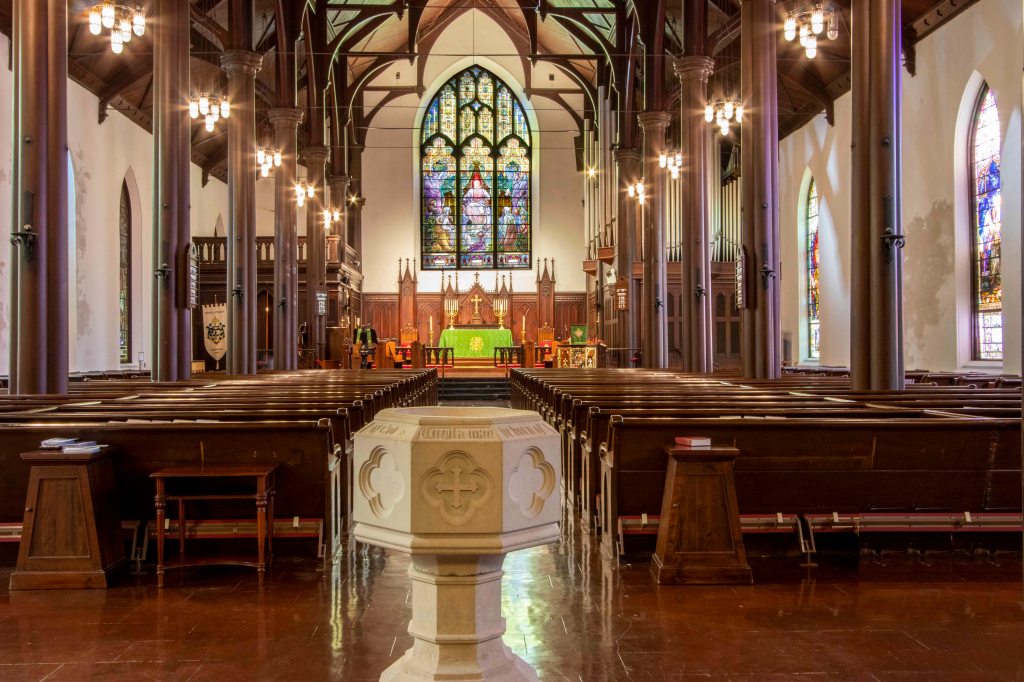Last Sunday after Epiphany
February 14, 2021
Mark 9:2-9
When you’re learning how to read music, you’re introduced to this whole new language and mathematical system. It was a lot for a sixth grade tuba player like me to learn, but eventually I got the hang of it. The first thing they teach you about are the musical notations; there are whole notes, half notes, quarter notes, sixteenth notes – you get the idea. They are notated by little circles with a variety of stems and flags, you’ve seen them. And then depending on the time signature, or the meter, you divvy up these notes to make sure you have the correct allotted number of beats for each measure. It’s really quite elegant. But of course, making music is not just knowing when and what to play. For all the system of long and short notes, there is a corresponding system of rests when you are silent. And since I played tuba, not one of the more melodious instruments in a band, I had to get accustomed to rests.
This brings up a critical point though. Knowing when not to play your tuba is just as important as knowing when to play your tuba. Playing in the middle of what is supposed to be silence is just as bad, perhaps even worse, than playing something wrong when it’s loud.
Silence. It’s a philosophical question really – does silence interrupt noise or does noise interrupt silence? Is silence the absence of noise or is noise the absence of silence? In the twenty first century, we are accustomed to a constant background hum of noise. Even as I prepared this sermon, I heard the clock ticking, the traffic humming outside, the heater clicking off and on. Our environments are permeated with noise. And that says nothing of the noise we choose to bring upon ourselves – the music, the tv, the aggravating little dings and beeps our phones subject us to. Sound is our default.
But not necessarily with God. Yes, the Lord God Almighty spoke the world into creation, but this is also the God who knows absolute silence. In a world of noise and sound and quarter notes and eighth notes God is the great rest. We learn about God’s arresting silence from the holy scriptures. After six days of ordering how the world is to be made, God takes a Sabbath rest and remains silent on the seventh day (Genesis 1:1-2:4). Elijah the prophet is summoned to meet God at Horeb, and God is not in the great wind, God is not in the earthquake, God is not in the fire; God only reveals himself after “a sound of sheer silence” (I Kings 19:11-18). And then, on another mountain, we have this unnerving story of the Transfiguration. Revealed in light resplendent, with clothes so dazzling white such as no one on earth could bleach them, Jesus is revealed to Peter, James, and John. Imagine the glory of that moment. There is Elijah, the prophet of Israel. There is Moses, the law giver and deliverer. And there is the Jesus, the Lord of Life.
But Peter has to go and ruin everything by opening his big mouth. “Rabbi, it is good for us to be here.” Oh Peter, master of the obvious. Peter goes on, “Let us make three dwellings, one for you, one for Moses, and one for Elijah” (Mark 9:5). But then here’s the kicker. The story says, “Peter did not know what to say, for they were terrified” (Mark 9:6).
We are Peter, aren’t we? When we feel uncomfortable we’ve just got to start talking, we have a tremendously difficult time keeping silence. We encounter the holiness of God and it makes us so terrified that we have to make some noise. We aren’t reading the music right so we just go ahead and blast our tubas right through the rests.
Silence. Silence is where we meet God, and as Peter would tell you, it is terrifying. That’s why we avoid silence at all costs. Have you ever sat down and tried to be silent before God? It’s impossible. First, you get fidgety. Suddenly, you itch all over the place, or you just can’t get right in your chair, you’ve got to adjust your clothes. And then maybe, maybe you get past that and you settle in. Then your brain goes searching for sounds. The washing machine just beeped because the load of laundry is done. The trash truck is coming around the corner. The ceiling fan is making that annoying squeak again. If you’re disciplined to make it through that part of the silence, you start up with “monkey brain” as Deacon Bob calls it. Desperate for anything, for any sound or stimuli, you start making your HEB list, you think about that phone call later today. You want to spend some in silence with God but your monkey brain is climbing up the walls and throwing bananas. This is the journey into silence.
Now, all sorts of people nowadays will tell you to take some time for silence. It’s not just priests who will say it. I’ve heard people say that we should get off our little screens more and let our minds wander. When you’re standing in line at the grocery store, they say to resist the urge to check your phone and instead to let your mind go free for a bit. You know there’s that new buzzword out there, “wellness.” Part of wellness is allowing our brains to take a break from all that digital stimuli.
But that’s not why Christians spend time in silence. No, we spend time in silence because God’s presence demands silence. Not because it’s good for us, not because we need some head space, but simply because all creation will be silenced when confronted with the holiness of God. God demands this silence. The prophet Zephaniah warns us to “be silent before the Lord God! For the day of the Lord is at hand” (Zephaniah 1:7). Another prophet, Zechariah warns, “be silent, all people, before the Lord; for he has roused himself from his holy dwelling (Zechariah 2:13). In one of my favorite passages from the Book of Revelation, Jesus the Lamb breaks the seventh seal and all heaven is held in absolute silence for half an hour (Revelation 8:1). This holy silence of God is not for our well-being or benefit; this is the silence of God that makes our jaws hit the floor in fearful response to God’s terrifying presence. A loving, gracious presence certainly; but as we learned from Peter, a terrifying presence, as well.
And yes, this is the very silence I am asking you to encounter. I ask you to follow the commandment from the cloud given to Peter, James, and John – “This is my Son, the Beloved; listen to him!” (Mark 9:8). Listen to him. During out 2021 – Year of Prayer, we are committing ourselves to all kinds of prayer. Today I urge you to be silent before the Lord God and listen. And in that silence, God will speak those words of abounding grace over you, too, “this my Son, the Beloved.” You can only hear that if you listen.
Now, as we come to a close, I understand the oxymoron that is a sermon on silence. The irony is not lost on me. So I ask that you consider these words like those musical notes that tell you when and what to play. These words are necessary but what defines one sound from the next is the time of silence. In the measure of music that is your life, remember that too much sound becomes just a noise. Take a lesson from Peter, do not feel that you have to fill every waking moment with a sound or with noise or with words. It is the rests, the times of silence, that give meaning to moments of sound. So draw up your courage, prepare yourself for the terrifying exercise that is silence, prepare to meet the Lord God, and listen.






Leave a comment